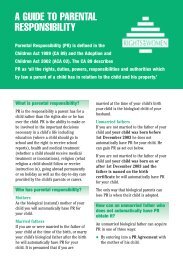Focus on Women - issue 05 - Rights of Women
Focus on Women - issue 05 - Rights of Women
Focus on Women - issue 05 - Rights of Women
You also want an ePaper? Increase the reach of your titles
YUMPU automatically turns print PDFs into web optimized ePapers that Google loves.
focus <strong>on</strong> women 08-06 16/8/06 10:57 am Page 8<br />
c<strong>on</strong>sent”. However, the victim’s level <strong>of</strong><br />
voluntary intoxicati<strong>on</strong> resulted in<br />
unc<strong>on</strong>sciousness and the inability to<br />
remember whether c<strong>on</strong>sent was given.<br />
We argued that where a victim is<br />
unc<strong>on</strong>scious any c<strong>on</strong>sent she may have<br />
given prior to becoming unc<strong>on</strong>scious<br />
ceases to exist. We have called <strong>on</strong> the<br />
Government to clarify that where a<br />
victim is unc<strong>on</strong>scious, for whatever<br />
reas<strong>on</strong>, she cannot c<strong>on</strong>sent.<br />
Expert evidence<br />
<strong>Rights</strong> <strong>of</strong> <strong>Women</strong> believe that expert<br />
evidence in sexual violence trials can<br />
have a vital role in dispelling myths and<br />
countering the stereotypes that<br />
c<strong>on</strong>tinue to exist. For example, at the<br />
same time as Dougal a poll by Amnesty<br />
Internati<strong>on</strong>al found that a third <strong>of</strong><br />
people believed that if a woman is<br />
flirtatious she is partially or totally<br />
resp<strong>on</strong>sible for being raped and more<br />
than a quarter (30%) believed that a<br />
woman was partially or totally<br />
resp<strong>on</strong>sible for being raped if she was<br />
drunk. These attitudes are particularly<br />
disturbing in the c<strong>on</strong>text <strong>of</strong> prosecuting<br />
rapists given that potential jurors are<br />
drawn from the general public.<br />
We called <strong>on</strong> the Government to go<br />
further than its proposals in the<br />
c<strong>on</strong>sultati<strong>on</strong>. We believe that limiting<br />
expert evidence to a hypothetical victim<br />
and situati<strong>on</strong>, without examining the<br />
actual victim or the actual<br />
circumstances, unnecessarily limits the<br />
impact and usefulness <strong>of</strong> expert<br />
evidence. We also called for expert<br />
evidence to be used in domestic<br />
violence cases.<br />
Sentencing<br />
When the Sentencing Guidelines<br />
Council (SGC) released its proposed<br />
guidelines for sentencing under the<br />
SOA, the media headlines ranged from<br />
“’Acquaintance’ rapists to receive<br />
lighter sentences” (The Telegraph, 8<br />
June 2006) to “Victim harm central to<br />
new rape sentencing guidelines” (The<br />
Guardian, 7 June 2006). Whilst this<br />
was a c<strong>on</strong>sultati<strong>on</strong> process and the<br />
guidelines are not final, this was likely<br />
to be the last c<strong>on</strong>sultati<strong>on</strong> before the<br />
finalisati<strong>on</strong> <strong>of</strong> the guidelines. For more<br />
informati<strong>on</strong> <strong>on</strong> the SGC see “Sorry<br />
may save wife-beaters from jail” in this<br />
<strong>issue</strong>.<br />
The c<strong>on</strong>sultati<strong>on</strong> c<strong>on</strong>tains several<br />
welcome points. We welcomed the<br />
acknowledgement that all n<strong>on</strong>c<strong>on</strong>sensual<br />
<strong>of</strong>fences involve the<br />
violati<strong>on</strong> <strong>of</strong> the victim’s sexual<br />
aut<strong>on</strong>omy and will result in harm. We<br />
also welcome the acknowledgment<br />
that the effects <strong>of</strong> sexual <strong>of</strong>fending<br />
may be physical and/or psychological<br />
and that the psychological effects may<br />
be equally or even more serious, but<br />
much less obvious (even<br />
unascertainable) at the time <strong>of</strong><br />
sentencing. Further, the SGC<br />
guidelines state that the existence <strong>of</strong><br />
any relati<strong>on</strong>ship between the <strong>of</strong>fender<br />
and victim should not affect the<br />
starting points for sentencing. We<br />
str<strong>on</strong>gly believe that this is the correct<br />
approach to sentencing.<br />
However, we believe that the SGC<br />
fundamentally undermined this<br />
principle, by stating that an <strong>of</strong>fenders<br />
8
















